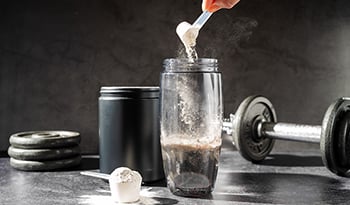Fitness Benefits of Branched-Chain Amino Acids (BCAAs)
The three branched-chain amino acids (BCAAs) are valine, leucine and isoleucine. They are included in the 20 amino acids that are needed by the body to make proteins and the nine essential amino acids. They are considered branched-chain because they have a “branched” side chain consisting of one carbon atom and three hydrogen atoms. These amino acids must be consumed through the diet or supplements.
BCAAs are the only amino acids that bypass the liver and go directly into the bloodstream. This means that consuming them can directly impact their concentrations in muscle tissue. There are several proposed and researched benefits to consuming branched chain amino acids either before, during or after exercise including decreased fatigue, increased muscle growth, improved recovery and improved mental focus. Here is a look at the research:
BCAAs for Muscle Growth
BCAAs contribute to energy metabolism during exercise. Leucine, in particular, has been shown to promote muscle protein synthesis in studies. BCAAs may have an anabolic effect due to their impact on growth hormone and providing amino acids needed for protein synthesis.
It is important to remember that all nine essential amino acids are required to produce muscle protein. If all of these essential amino acids are needed for muscle protein synthesis then consuming only three of the nine essential amino acids may not be adequate for stimulating muscle protein growth. Consuming a BCAA supplement in conjunction with intact protein such as a whey protein supplement may support a greater potential for an anabolic response to exercise.
BCAAs for Mental Focus
BCAAs can increase resistance to fatigue and increased fat oxidation during exercise. BCAAs may work to lower lactate levels and improve muscle oxidation. A study looking at BCAA supplementation in soccer players showed that the BCAA group had slightly better reaction times than those in the placebo group, which indicates there might be a benefit from supplementing with BCAAs prior to exercise types that require a quick reaction time.
Decreased Fatigue
One study investigating the use of BCAA supplementation during an off-shore cycling race supported its use for reducing fatigue. A slight decrease in the rate of perceived exertion was seen in male cyclists who were given a BCAA supplement prior to exercise and again every 15 minutes during exercise.
Increased Power
Eleven resistance-trained males were provided either 20 grams BCAAs or a placebo and the BCAA group was able to maintain better power during exercise as compared with the control group.
Improved Recovery
Study conclusions are mixed on whether or not BCAAs can contribute to post-workout recovery. In one study, muscle damage was lessened in untrained females performing seven sets of 20 squats and supplementing with BCAAs. Another study showed that there was a significant decrease in muscle damage in trained subjects when BCAA was given as compared with the control group. Less muscle soreness was also reported in the group supplementing with BCAAs. Other studies have shown no significant difference in recovery between those taking BCAAs and those taking a placebo.
When and How to Use BCAAs
- Branched-chain amino acids might be helpful in certain instances. If protein intake is adequate then supplementing with additional BCAAs may not impact muscle growth. If a person is unable to get enough of these essential amino acids through diet due to dietary restrictions or they are trying to lose weight and cutting back on calories, it might be helpful to supplement with BCAAs before or during a workout.
- There may be some benefit from taking BCAAs before or during a workout to improve reaction time and for long-duration activity to reduce fatigue.
- BCAAs along with carbohydrate might help with decreasing the rate of perceived exertion during a workout, but the research has not been able to conclusively show that this helps with performance outcomes.
- BCAA supplements may provide some benefit for recovery in decreasing muscle damage, but there may not be an impact of decreasing muscle soreness. The protective role of BCAAs in recovery might be better for untrained versus trained individuals.
- Many of the studies differed in the amount of BCAAs given as well as the timing of the supplementation (before or during activity). This could influence the outcomes. It is quite possible that the timing of the supplement, as well as the amount, could influence how much a person would benefit from supplementation.
- The research indicates that the best time to supplement with BCAAs is before or during exercise. After exercise, it is advised to get a food or supplement that contains all 9 of the essential amino acids. Examples include meat, fish, yogurt, whey protein isolate or lentils with quinoa.
- Many of the studies were limited in the number of subjects—more studies with greater subject size could help make firmer conclusions about the possible benefits of BCAA supplementation.
References:
- https://www.ncbi.nlm.nih.gov/pubmed/15173434
- https://www.ncbi.nlm.nih.gov/pubmed/21297567
- https://www.ncbi.nlm.nih.gov/pubmed/22050133
- https://www.ncbi.nlm.nih.gov/pubmed/18704484
- https://www.ncbi.nlm.nih.gov/pubmed/9124069
- https://www.ncbi.nlm.nih.gov/pubmed/8876349
- https://www.ncbi.nlm.nih.gov/pubmed/20601741
- https://www.ncbi.nlm.nih.gov/pubmed/21744005
- https://www.ncbi.nlm.nih.gov/pubmed/15173434
- https://www.ncbi.nlm.nih.gov/pubmed/25202189
- https://www.ncbi.nlm.nih.gov/pubmed/26853239
- https://www.ncbi.nlm.nih.gov/pubmed/11310926
- https://www.ncbi.nlm.nih.gov/pubmed/28944645
- https://www.ncbi.nlm.nih.gov/pubmed/24477835
- https://www.ncbi.nlm.nih.gov/pubmed/22569039
- https://www.ncbi.nlm.nih.gov/pmc/articles/PMC5568273
- https://www.ncbi.nlm.nih.gov/pubmed/16365096
DISCLAIMER:This Wellness Hub does not intend to provide diagnosis...
















































































 Table of Contents
Table of Contents
















